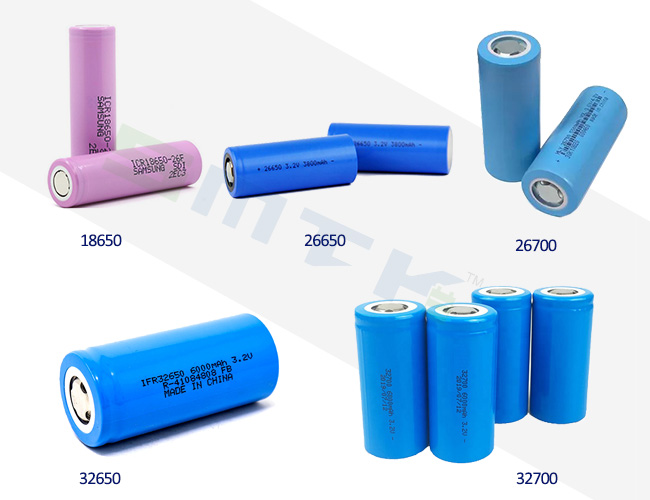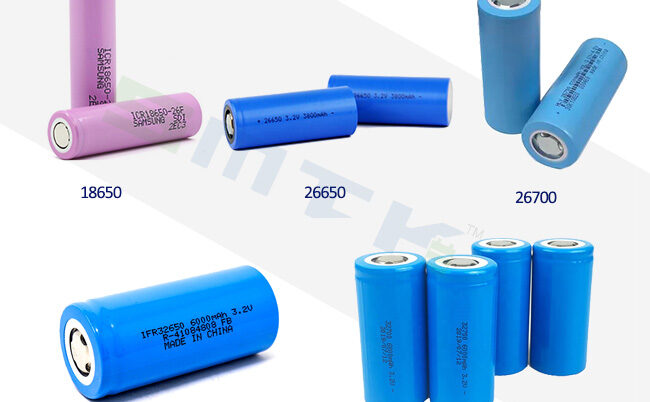Lithium battery cells come in various sizes and capacities, each suited for different applications. In this blog, we’ll explore the characteristics, advantages, and typical uses of five popular lithium battery cells: 18650, 26650, 26700, 32650, and 32700. Additionally, we’ll provide guidance on how to choose the right cells for your battery pack.
| Cells | Size | Capacity | Application | Advantage |
| 18650 | 18*65( diameter*length) | 1800-3500(mAH) | Commonly used in laptops, flashlights, and e-cigarettes due to their compact size and high energy density. | High energy density, widely available, and cost-effective. |
| 26650 | 26*65( diameter*length) | 3800-5000(mAH) | Ideal for power tools, electric vehicles, and solar energy storage systems. | Higher capacity and longer runtime compared to 18650 cells, suitable for high-power applications. |
| 26700 | 26*70( diameter*length) | 5000(mAH) | Used in applications requiring slightly more capacity and longer runtime than 26650 cells, such as larger power tools and some electric vehicles. | Balances size and capacity, offering a bit more energy storage without significantly increasing the size. |
| 32650 | 32*65( diameter*length) | 5500-6000(mAH) | Suitable for heavy-duty applications like electric vehicles, renewable energy systems, and robust power tools. | High current output, long run life, and can be recharged many times before capacity degrades. |
| 32700 | 32*70( diameter*length) | 6000-6500(mAH) | Used in high-capacity energy storage systems, larger electric vehicles, and industrial applications. | Offers even higher capacity and longer runtime, making it ideal for applications requiring substantial energy storage. |

How to Choose the Suitable Cells for Your Battery Pack
Selecting the right battery cells for your pack involves considering several key factors to ensure optimal performance and longevity. Here’s a detailed guide based on brand, capacity, discharge current, and resistance:
1. Brand
– Reputation and Reliability: Choose cells from reputable manufacturers known for quality and reliability. Brands like Panasonic, Samsung, LG, and Sony are well-regarded in the industry.
– Warranty and Support: Consider the warranty and customer support offered by the brand. Reliable brands often provide better after-sales service and support.
2. Discharge Current
– Continuous Discharge Rating (CDR): This is the maximum current a battery can safely discharge continuously without overheating or degrading. It’s measured in amperes (A).
– High-Drain Applications: For devices that require high power output, such as power tools or electric vehicles, choose cells with a high CDR. For example, a cell with a 20A CDR is better suited for high-drain applications than one with a 10A CDR.
– Pulse Discharge: Some applications may require short bursts of high current. Ensure the cell can handle these pulses without damage.
3. Internal Resistance
– Impact on Performance: Lower internal resistance means the battery can deliver higher currents more efficiently and with less heat generation.
– Measurement: Internal resistance is measured in milliohms (mΩ). Cells with lower internal resistance are preferable for high-performance applications.
– Consistency: Ensure that all cells in a pack have similar internal resistance to avoid imbalances and ensure uniform performance.
Conclusion
Understanding the differences between these lithium battery cells can help you choose the right one for your needs. Whether you’re powering a small device or a large energy storage system, there’s a lithium battery cell that fits your requirements. By considering factors such as application requirements, capacity, size, discharge rate, cost, and safety, you can make an informed decision and optimize the performance of your battery pack.
Of course! If you need further customization or additional information, our overseas experts will recommend suitable cells to you according to your requirements, just feel free to ask!

